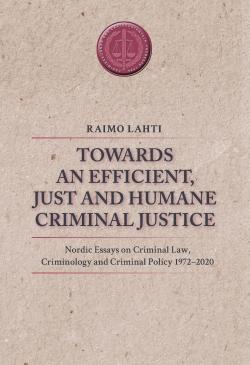Towards an Efficient, Just and Humane Criminal Justice. : Nordic Essays on Criminal Law, Criminology and Criminal Policy 1972–2020

Nyckelord:
kriminologia, kriminologia → Pohjoismaat, kriminaalipolitiikka, kriminaalipolitiikka → Pohjoismaat, rikosoikeus → Suomi, rikosoikeus → Pohjoismaat , rikollisuus, rikollisuuden ehkäiseminen, seuraamukset, perusoikeudet, lakien yhdenmukaistaminen, eurooppalaistuminen, kansainvälinen rikosoikeus, bioetiikka, lääkintäoikeus, eutanasia, abortti, ympärileikkaus, ft: alkiot, ft: bio-oikeus, rikoslain uudistaminenSynopsis
This collection of essays on criminal law, criminology and criminal policy includes a selection of my articles from the year of 1972 to the year of 2020, i.e., from a period of 49 years. The writings – in all 32 – chosen for the compilation are written in English and 30 of them have been published earlier. The main aim with this anthology is to crucially widen the access of my writings for comparative purposes. The articles are divided into seven chapters. Chapters I–VI cover a large spectrum of criminal sciences, and they are – in particular, in Chapters IV–VI – written rather from a Nordic (Scandinavian) than from a narrower Finnish perspective. The title of the anthology expresses its main message: towards an efficient, just and humane criminal justice. Chapter VII includes five articles related to bio-ethics and (criminal) law. The reason for that chapter’s attachment is to present some of my contributions to the new discipline entitled ‘Medical law and biolaw’.
The intensified internationalization and Europeanization of criminal law and justice have changed the role of comparative law and criminal sciences in general. There is much more need for comparison of legal orders due to the emergence of European criminal law and international criminal law and due to the increased interaction between European and global legal regulations and the national legal orders. We also need more evidence-based criminological research to be utilized in criminal-policy planning and as a foundation for rational policy decisions.






